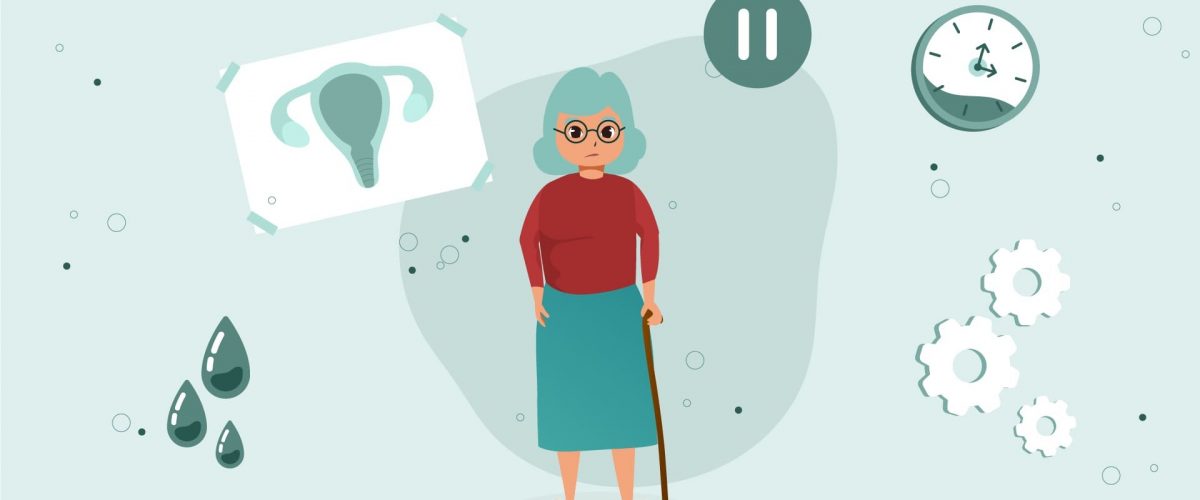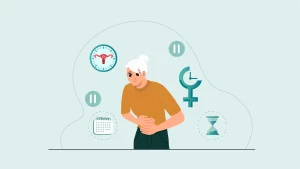Have you reached menopause ? On top of all the other unpleasant symptoms associated with this period, do your eyes sting or feel gritty ? Are they red, irritated and dry ? If so, you’re probably suffering from dry eye.
Menopause signals the end of a woman’s reproductive period. It is associated with a whole range of unpleasant symptoms, including hot flushes, weight gain, insomnia, hair loss, urinary incontinence, irritability, tiredness, dry skin, vaginal dryness and dry eye. Some women will not be affected at all, as every woman experiences menopause differently. However 3 in 4 women will have to deal with at least one of these symptoms.
Dry eye and age
The average age at which menopause occurs is 51 years, by which time both men and women are already affected by cell ageing. Tear production decreases noticeably after the age of 40 years. The tear glands atrophy, meaning the eyes are less hydrated, and the meibomian glands become blocked or disappear and can no longer produce the tear film.
The older you get, the more likely you are to become ill and therefore take medicines that may have the side effect of aggravating dry eye. Antidepressants and sleeping tablets for anxiety or insomnia, as well as chemotherapy for cancer, can all cause dry eye to become worse.
Dry eye and menopause
Women over the age of 50 are doubly at risk of dry eye, since they are affected by the menopause in addition to the normal ageing process. After the age of 50, a woman’s natural fertility cycle stops. Production of two hormones involved in the reproductive cycle, oestrogen and progesterone, slows down, marking the end of ovarian activity.
Lower oestrogen levels lead to a reduction in collagen and elastin, and cause generalised dryness: of the skin, vagina and eyes. Tear gland production is also affected by lower oestrogen levels. Sixty percent of menopausal women are affected by this syndrome: it is the second most common symptom after hot flushes.
Tips and tricks to reduce dry eye
To limit the effects of menopause symptoms — and dryness in particular — you can make adaptations to your diet and lifestyle, as detailed below.
Eat foods rich in phytoestrogens; omega-3; vitamins A, C and D; and micronutrients:
- Phytoestrogens mimic the action of female hormones, but are less powerful. They are found in hops and linseed
- Omega-3 can help combat hot flushes, reduce cardiovascular risks and prevent age-related macular degeneration. It is needed to keep the retina functioning properly, contributes to good eye hydration and supports the meibomian glands. It is found in fish such as salmon, mackerel, sardines and herring, as well as in egg yolk and nuts, particularly walnuts and hazelnuts
- Vitamin A is found in brightly coloured vegetables such as carrots, beetroot, peppers and tomatoes
- Vitamin C is found in citrus fruit, kiwi and parsley
- Vitamin D
- Zinc
Adopt a healthy lifestyle
- Stay hydrated: women become dehydrated during menopause and this affects the eyes. Drink 1.5 litres of water per day
- Get a good night’s sleep
- Exercise
- Avoid working at a screen for long periods
- Do not smoke
- Look after your eyes:
- Stimulate the meibomian glands by blinking frequently
- Apply a mask or warm compress to the eyes for 5 to 10 minutes
- Blink under the mask, after 6 minutes, 3 to 5 times, using full blinks.
- Protect yourself from the wind and sun, and try not to overheat your house or use air conditioning
- Use a humidifier
IF YOU ARE SUFFERING DUE TO DRY EYE, PLEASE SEE AN OPHTHALMOLOGIST.




